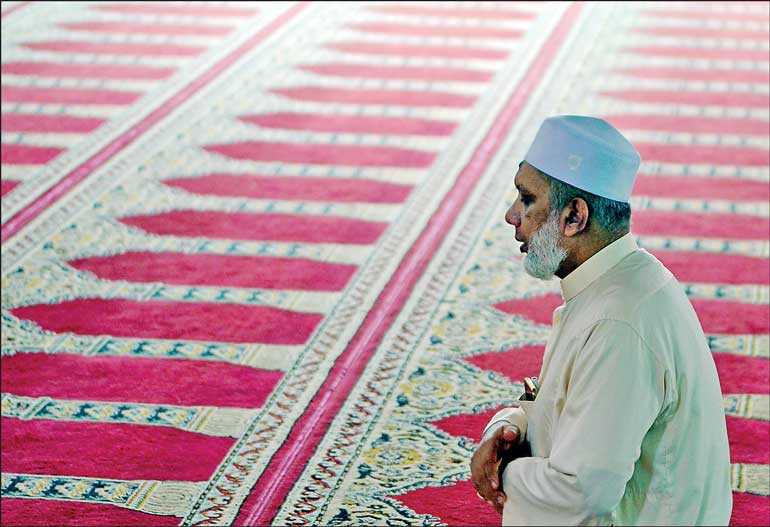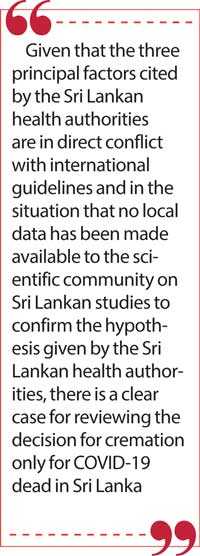Tuesday Feb 24, 2026
Tuesday Feb 24, 2026
Friday, 13 November 2020 00:00 - - {{hitsCtrl.values.hits}}

The continuation of the cremation only policy for COVID-19 dead is causing seriously affecting the mental and psychosocial health of two million Sri Lankan Muslims who are have accounted for almost 48% of the COVID deaths in Sri Lanka as of 7 November
The following are excerpts from a letter to Health Ministry Secretary Dr. S.H. Munasinghe by a group of patriotic
Sri Lankan Muslims:
Currently, the only available method of disposal of COVID -19 dead in Sri Lanka is cremation.
The basis to arrive at this decision when the guidelines were prepared was based on the factor that in January/February and early March 2020 the scientific community in Sri Lanka did not have adequate information on the SARS-CoV-2 virus.
Based on this lack of knowledge on the part of Sri Lankan experts in judicial medicine, epidemiology and microbiology, Sri Lankan health authorities decided to recommend measures to take no chances for the virus to spread from the dead to the living and thus recommended cremation only in the absence of conclusive scientific, ethical and moral evidence to do so at the time.
The time elapsed since the identification of the virus in late December 2019/early January 2020 is now 180 days or approximately six months. In this period there have been numerous scientific publications on the structure/characteristics (virology), epidemiology and patho physiology of the SARS-CoV-2 virus.
In this context it is time to look back at the scientific literature published on the virus with a particular reference to its spread from the dead to the soil, water and its further spread through soil, water (water table) to the general public and cause a public health issue in the international and local (Sri Lankan) arenas.
As said before, we do not know the science of the SASR-CoV-2 virus fully. In this massive lacuna of knowledge on the virus, acting in the interest of public health and safety becomes a challenge and goes beyond hard core science itself. This is because scientist will always have diametrically opposing views with evidence to drive home their hypothesis with passion. This lacuna of knowledge creates a situation where there is a dilemma in terms of the science and the ethics of any and all decision taken even with the best of intentions.
In this context, have the decision makers in Sri Lanka paid adequate or indeed any attention to resolve this scientific and ethical dilemma with regard to the issue of final disposal of the dead due to COVID-19 in the accepted ethical scientific manner?
Three principal reasons
The position of the political leadership of Sri Lanka has always been that they will follow the advice given to them on the disposal of COVID dead by the health authorities. The position of health authorities to arrive at the decision to recommend cremation only has been based on the following three principal reasons:
1. The ‘current’ knowledge on the SARS-CoV- 2 virus is unknown as of now (This statement was made on 13 April 2020 and reiterated on 15 April 2020 at technical meetings held with Health Ministry Officials).
2. The SARS-CoV-2 virus in dead bodies when buried in Sri Lanka can spread to the water table thus contaminating it and spreading the virus to a large section of the population through water thus worsening the pandemic situation.
b. Given the militant history of the Sri Lankan Muslims (example cited was the Easter Sunday bombings of 21 April 2019) the Sri Lankan Muslims may use the dead body of the COVID-19 person as a biological weapon against other Sri Lankan citizens. This statement was publicly repeated by the Health Ministry Official on a BBC television interview a few days later (18 April 2020).
Reviewing the evidence
Let’s review the evidence for each of the above as of November 2020.
1. The notion that the dead bodies of Sri Lankan Muslims will be used to extract the virus and weaponise it as Weapon of Mass Destruction (WMD) has not materialised anywhere in the world. The technological and science to even attempt creating a biological weapon using the SARS-CoV-2 virus is far too complex and advanced to be attempted by extremist Islamic groups operating in Sri Lanka as per current available intelligence reports. The process of weaponising the COVID -19 virus will at the minimal require Biological Safety Level (BSL) 3 or above laboratory facilities and at present only the Medical Research Institute of the Ministry of Health and Universities of Sri Jayewardenepura, Colombo and Peradeniya have BSL 3 level laboratories. No evidence exists that BSL 3 level laboratories exists outside the direct purview and close supervision of the Government of Sri Lanka and the intelligence and defence establishments. A literature search of the international data bases for weaponisation of SARS-CoV-2 virus yielded no results. If such a process is indeed available at international level it is been kept classified out of reach of potential rouge scientists.
2. With regard to the knowledge of the SARS-CoV-2 virus spreading to cause public health issues in countries where burial of such dead bodies has occurred, the international scientific data bases yield no results. The WHO in its Infection Prevention and Control for the Safe Management of a Dead Body in the Context of COVID-19 – Interim Guidance dated 24 March 2020 and 4 September 2020 clearly recommends burial as an option after having reviewed all the available scientific, ethical and moral issues related to burial of COVID-19 dead as way back as March 2020. The WHO has not changed it stance on recommending burial as option for COVID -19 dead to date.
3. A review of the international literature on the mass spreading of the SARS-CoV -2 virus to the ground water table in the international data bases, too yields no results. The WHO and UNICEF publication titled Water, Sanitation, Hygiene, and Waste Management for the COVID-19 Virus – Interim Guidance dated 19th March 2020, 23rd April 2020 and 29th July 2020 gives information and recommendations on the issue of contamination of ground water by SARS-CoV-2 virus. An extract from the interim guidance report is given below; (The WHO and UNICEF have not changed it stance on recommending burial as option for COVID -19 dead to date).
‘Currently, there is no evidence about the survival of the COVID-19 virus in drinking-water or sewage. The morphology and chemical structure of the COVID-19 virus are similar to those of other human coronaviruses for which there are data about both survival in the environment and effective inactivation measures. This document draws upon the evidence base and WHO guidance on how to protect against viruses in sewage and drinking-water. This document will be updated as new information becomes available.’
Given that the above three principal factors cited by the Sri Lankan health authorities are in direct conflict with international guidelines and in the situation that no local data has been made available to the scientific community on Sri Lankan studies to confirm the hypothesis given by the Sri Lankan health authorities, there is a clear case for reviewing the decision for cremation only for COVID-19 dead in Sri Lanka.
Furthermore, in an interim guidance dated 4 November 2020 titled ‘Consideration for implementing and adjusting public health and social measures in the context of COVID-19,’ the WHO has clearly advices member states that such PHSM measures ‘…should be weighed against the impact these measures have on societies and individuals. Consideration includes impact on economy, security, mental health and psychosocial well-being, human rights, food security, socioeconomic disparities…’
It summarises its guidance by stating that ‘the overall health and well-being of communities should therefore be at the forefront of considerations when deciding on implementing PHSM.
Serious impact on Muslims
The continuation of the cremation only policy for COVID-19 dead is causing seriously affecting the mental and psychosocial health of two million Sri Lankan Muslims who are have accounted for almost 48% of the COVID deaths in Sri Lanka as of 7 November.
The social impact of the cremation of COVID-19 Muslim dead bodies is best summarised by the following statement made by an elderly Muslim gentleman recently:
“I don’t fear getting corona at any time anywhere in the world; nor do I fear dying of corona anywhere in the world; but I fear being cremated in Sri Lanka if I die of corona.”
As we have depicted and no doubt you as a representative of the people are fully aware this decision to only allow cremation for COVID-19 dead on unsound scientific, medical ethical and moral grounds is causing severe mental and psychosocial hardship to the all Sri Lankan Muslims regardless of politics, social status or any other parameter.
We have been making scientific, medical, and political representation since March 2020 to the Sri Lankan Government to in the very least review the cremation only policy and include the burial option for COVID-19 dead to no avail.
Hence we as an integral part of the citizenry of Sri Lanka have now have resort to pleading to the authorities on humanitarian and grounds of sympathy for the Government of Sri Lanka to very kindly consider reviewing the decision to continue with the cremation only policy for the COVID-19 dead.
We sincerely hope that the you will facilitate the necessary scientific and administrative process to be put in pace to review the current cremation only policy for COVID-19 dead in Sri Lanka based on the review of the facts presented.
References
The letter included attachments:
1. Two attachments – Infection Prevention and Control for the safe management of a dead body in the context of COVID-19 Interim guidance dated 24 March 2020 and 4 September 2020 issued by the WHO.
2. Three attachments – Water, sanitation, hygiene, and waste management for the COVID-19 virus Interim guidance dated 19 March 2020, 19 April 2020 and 29 April 2020 issued by the WHO and
UNICEF
3. Considerations for implementing and adjusting public health and social measures in the context of COVID-19 Interim guidance dated 4 November 2020.
4. Statement on COVID-19: Ethical Considerations from a Global Perspective Statement of the UNESCO International Bioethics Committee (IBC) and the UNESCO World Commission on the Ethics of Scientific Knowledge and Technology (COMEST) dated 26 March 2020.
5. Recommended Measures for the Safe Burial of Bodies of Deceased Persons with COVID-19 – Professional Working Group for the safe burial of bodies of deceased persons with COVID-19 in Sri Lanka (details the hydro-geological factors in Sri Lanka in relation to disposal of COVID dead)
Additional reading references:
1. COVID Victims and Funeral Rights, by Justice Dr. Saleem Marshoof et al
2. Initial letter written to the President dated 25 March 2020 calling for review of cremation only policy for COVID-19 dead (has extensive scientific reference supporting call for inclusion of burial as an option citing internally data and guidelines)
3. Minutes of the meeting held with Director General of Health Services on 13 April 2020
4. Copy of Autopsy Practice and Disposal of Dead Body during the ongoing COVID-19 infectious disease pandemic through Chapter 7 of the Provisional Guidelines for Clinical Management of COVID-19 (March 2020)